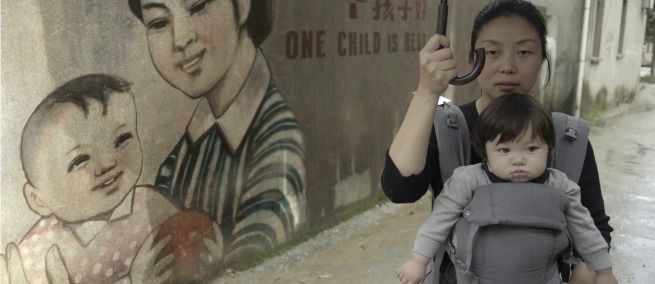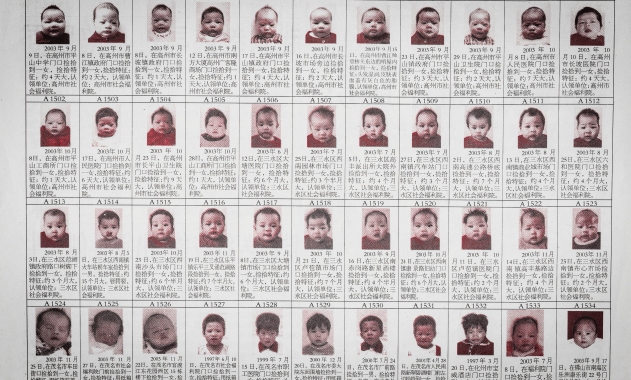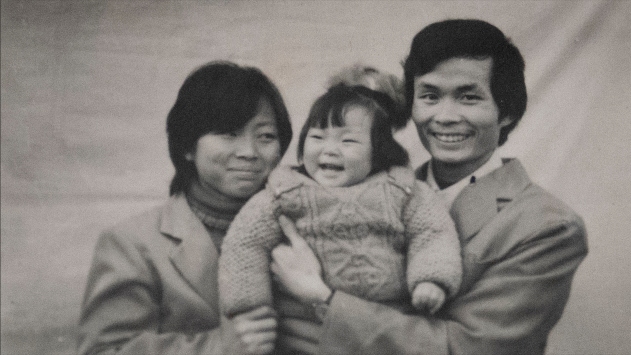
The new documentary ONE CHILD NATION is Chinese-born filmmakers Nanfu Wang (HOOLIGAN SPARROW) and Jialing Zhang’s investigation into the human consequences of China’s One-Child Policy, and the hidden economic incentives that helped to fuel it. The One-Child Policy was written into China’s constitution in 1982 and was in effect until 2015. We spoke with director Nanfu Wang–who also served as the film’s producer, cinematographer, editor, and subject–in New York on July 24. ONE CHILD NATION, which won the U.S. Grand Jury Prize at the 2019 Sundance Film Festival, is now in theaters.
Science & Film: In your film, you show how government propaganda encouraged people to adhere to the One-Child Policy for the good of the country. Why do you think that was such a persuasive argument?
Nanfu Wang: For any people, any country, “Make America Great”… collectivism and altruism are ways of getting people to do things–patriotism especially. That’s the way a government makes people forget about their rights, forget about their individuality, and follow the national agenda.
S&F: One of the shocking parts of ONE CHILD NATION is the revelation of how Chinese adoption agencies took advantage of the One-Child Policy. When and how did you learn about that?
NW: I learned as we were making the film that something was happening around adoption and that children were being confiscated. Someone introduced me to journalist Jiaoming Pang’s book, The Orphans of Shao, which is about that. It was shocking. I didn’t know any of those things were happening in China. I think because the book was self-published by a very small non-profit organization there wasn’t much readership—even I hadn’t read it before I was making the film. What was even more shocking were the details. For example, there was a family whose first-born child was confiscated and adopted by an American family. There was no violation of the one-child policy [by the family]. The reason that they confiscated the first-born child goes back to when in rural areas when people get married they don’t register for marriage in the courthouse. For thousands of years, the Chinese tradition is that when you get married you have a banquet, two families in the village eat together, celebrate, and then you are officially married. Marriage law was new in the 1940s when the new China was established. In rural areas, a lot of people still don’t get a marriage certificate. So this couple got married that way: the whole village ate together, and they had their first son. Then the government came and said, you don’t have your official marriage certificate, your marriage is illegal, and therefore we are taking your child. That’s how their child was taken away and eventually got adopted here [in America].

Finding ads.
S&F: Do you think there was an economic incentive from the government to confiscate children?
NW: All orphanages were state owned. When we met the [child] trafficker, he told us how the orphanages hired him. For the international adoption program to work there are several legal steps. Each adoptive family has to get a certificate saying this child was abandoned and is an official orphan. This certificate has to be stamped by the police. The trafficker told us that when he was hired he would get a stack of already stamped blank certificates which left the location out and the name blank; it was all blank paperwork that they made up and submitted.
S&F: You interviewed one of the women who performed abortions. She said that even in retrospect she would probably do the same thing again. What was that interview like for you?
NW: My co-director and I watched that and we both felt a lot of empathy towards her because we don’t see her as an evil person–the opposite. We wanted to make it clear that there is no perpetrator in this story; everyone is a victim. We wanted to make it clear the sympathy and empathy we felt for her. We also asked ourselves, what if we were her? What choices would we have made? When I was living in China before I left for the U.S., the last job I had was working at a university as a staffer and one aspect of my job was writing propaganda articles for the university. I aspired to be a good staffer. I aspired to be a good writer. I aspired to be seen as useful and a good worker, so that made me work really hard and be creative. If you are in the position of working for the government and you just want to be a good worker, very likely the person would do the work that is against their own morality simply because that was what they were told was the right thing to do. For someone who grew up in a country and educational system that taught that the collective is always above the individual, you believe that you can’t be selfish. So thinking about that, it’s likely that if I were her I would have made the same decisions. That was scary but definitely made us much more empathetic towards her.
S&F: This makes me think about the Nazis and soldiers during World War II.
NW: Similar. The ideology and mindset of following orders is all about how you make a good person do evil things.

Family photo of Nanfu Wang and her parents.
S&F: What do you think about the way that other countries are now talking about population control because of climate change?
NW: It’s ironic. A lot of countries right now are saying that we have an overpopulation problem, which is true, but they are saying we should do a similar policy to China’s One-Child Policy. [In the film,] we wanted to show that the policy had huge consequences. It’s not up to the government to control how many children one can have. That’s basic human rights.
I believe the Chinese leaders who initiated the policy thought, yeah let’s do this, this is a great policy. There were direct consequences: they knew that in order to enforce the policy they would have to use violence. But there were also indirect consequences. All of the consequences they hadn’t foreseen are showing up [now]: the aging society, the gender imbalance, and even the psychological trauma that generations are experiencing including the adopted children who are growing up and are going to become parents. That’s when they will truly reflect and want to know the answers to their own life stories.
S&F: Have any government officials in China seen the film?
NW: No, I don’t think they have.
We showed the film in Hong Kong and it will be shown in Taiwan soon and some other Asian countries. In China, there was interest from an underground festival but we haven’t [pursued that] for a few reasons. We want to wait until the release is done here and see what we want to do.
ONE CHILD NATION is now playing U.S. theaters distributed by Amazon Studios. Nanfu Wang’s other films include HOOLIGAN SPARROW, which was shortlisted for the 2017 Academy Award for Best Documentary Feature.
TOPICS